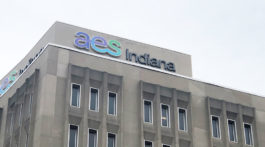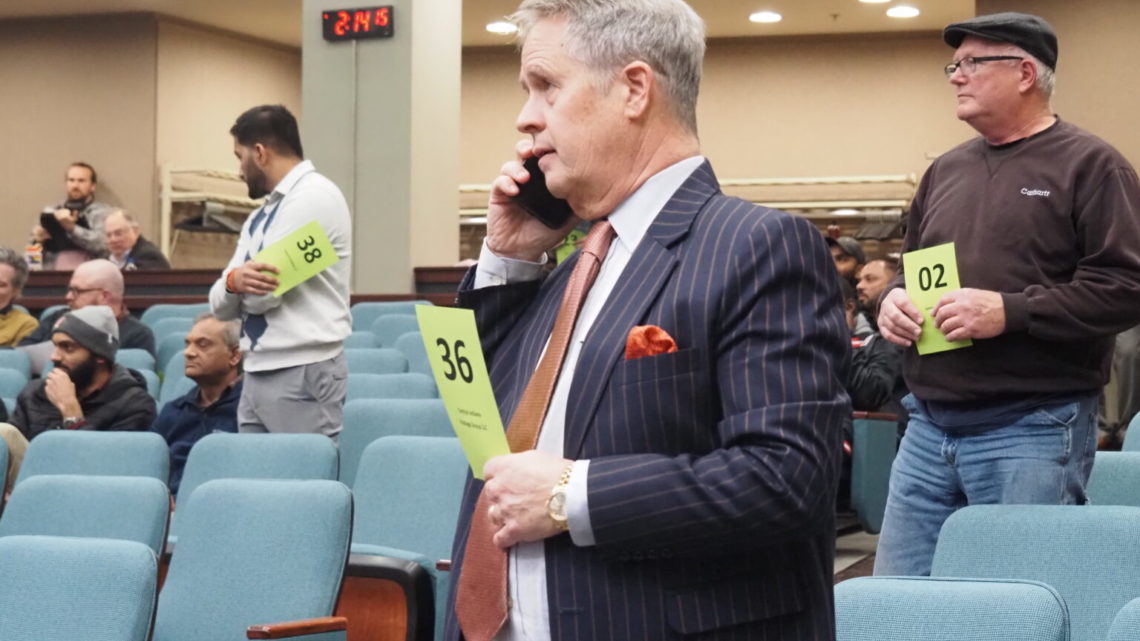by Whitney Downard, Indiana Capital Chronicle
Forty-two hopefuls turned out for the Indiana Alcohol and Tobacco Commission’s auction on Tuesday, out-bidding one another in an attempt to secure one of dozens of alcoholic beverage permits.
The most competitive bidding occurred during the package store portion, which included nine permits in seven counties. The most expensive bid came in at $330,000 for a Kosciusko County beer, wine and liquor permit in Winona Lake.
Some had only one interested party and were awarded based on a pre-bidding process.
The five restaurant permits available in Madison, Marion and Bloomington counties, on the other hand, had less competition. A beer and wine permit in Pendleton, located in Madison County, went for the minimum bid amount of $750.
“If you just keep your hand up, you’ll buy it,” joked Kyle Hupfer, co-owner of the Indiana Liquor Group LLC. The company won four out of the nine available package store permits, also commonly known as liquor stores.
Hupfer, the former chair of the Indiana Republican Party, shared that the groundwork ahead of the bidding was more intensive than the auction itself.
“You have to look at the localities and whether the markets — or population — can support another store,” Hupfer said.
Indiana Liquor Group CEO Chris Lamb said the entity had about 60 stores across the state, mostly in the northern half. In its six years of operation, Lamb said most of the company’s holdings had been purchased from existing package stores, rather than through the state’s auction process.
“They don’t come up that often,” Lamb said. “Now that we have a license, we have to look for real estate … for somewhere to build a store.”
According to a 2023 Inside Indiana Business story, Indiana Liquor Group is the second-largest liquor store owner in the state, behind Big Red Liquors Inc. Stores under the Indiana Liquor Group have many names but include Papa Joe’s Liquors in Richmond, Noblesville Wine & Spirits and Muncie Liquors.
Another group, JBMEnterprise LLC, also dominated the package store liquor licenses, acquiring four of the remaining five licenses. The last license went to someone who registered to bid as Mandeep Singh.
Limited number of permits
Pre-bid applications are due two weeks before the auction and require a security deposit. The amount depends on the type of permit sought — beer or wine only permits go for a minimum of $500 while combining the two costs at least $750. Getting a license for beer, wine and liquor costs at least $1,000.
As a self-funded agency with no general fund appropriations, the Indiana Alcohol and Tobacco Commission uses the auction funds to operate.
Each winning bid comes with a back-up. Unsuccessful bidders will get their deposits returned.
The state has a limited number of permits available and dozens of types of permits, which are calculated based on an area’s population. Following a census, when populations are recounted, more licenses become available in growing areas and bring more competitive bidding.
Need to get in touch?
Have a news tip?
Each permit type — whether a brewery, three-way restaurant or liquor — has its own process and limitations based on population and whether the area is incorporated. Earlier this year, alcoholic beverage lobbyists faced off during the legislative session over whether beer wholesalers could be allowed to sell liquor-based ready-to-drink cocktails.
Permits in competitive areas thus have the potential to go even higher — in the Fall 2022 auction, two Lake County package store permits went for more than $1 million each. Meanwhile, dozens of bids in smaller localities — whether grocery store permits or restaurant permits — frequently go for the minimum price.
However, winners sometimes fail to use their bids. If someone holds a permit in escrow for five years without acting upon it, it reverts back to the Alcohol and Tobacco Commission for auction. Local, county-based alcoholic beverage boards also vote on applications and dealer permits.











